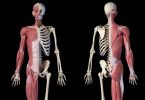To build muscle and strength, you need to workout regularly, the problem is that once you have worked out intensely you may not want to work out again for a few days.
Once of the main reasons why you may not want to work out could be the pain you feel the next day, or the DOMS (Delayed Onset Muscle Soreness) you are likely experiencing.
The purpose of the following article is to give you some easy to follow advice and tips to help you to recover from exercise. If you are looking to gain muscle and lose fat, this piece will benefit you. Please continue reading to discover what we suggest.
The Importance of Adequate Recovery
When you exercise intensely, in particular with resistance training, you are going to be damaging tiny muscle fibres.
These tears can take anywhere from 24 to 48 hours to be repaired and rebuilt [1]. This is why people often choose to spilt workouts into lower and upper body, as this gives the muscle fibres time to recover.
Working out a torn muscle too soon will cause further tissue breakdown. And will not give it the opportunity for repair and to grow bigger and stronger.
15 Tips for Post Workout Recovery

Here are some tips to help aid your recovery from exercise:
Tip #1. Look at What You Eat Before Working Out
Training is just one part of the equation, and your nutrition is the most important aspect of your muscle building efforts.
The foods you choose to eat will help repair those damaged muscle fibres.
Before you work out, you should aim to eat high quality protein, along with complex carbohydrates. I would also recommend that you consume them at least 2 hours beforehand.
The reason for this delay is to avoid any potential digestive issues or cramp while you work out.
Tip #2: Stretch Thoroughly
Stretching thoroughly before working out will help to relieve muscular tension, while also reducing muscle soreness experienced post-workout [2].
Failure to stretch may leave your muscles and joints tight and lacking in flexibility. This may make it difficult to complete the exercises using a full range of motion.
Tip #3: Drink a Protein Shake Post-Workout

Post workout recovery tips
Chances are you know how important protein is to muscle growth, but are you getting enough in your diet?
I would recommend consuming between 1.2-1.7 grams of protein for every kilogram of body weight every day.
Consuming a protein shake after your workout is a good idea to ensure you are getting enough. Choosing a quality whey isolate is recommended, rather than choosing a cheap option.
I would also suggest that you eat some fast-acting carbs after your workout. This will help to replace the lost glycogen levels, increase your insulin levels and restore energy.
The reason you should look to increase your insulin intake is because it can help to stop the breakdown of protein, and can also help to stimulate protein synthesis. Not taking proteins is a bad habit that makes you lose muscle, not fat.
Tip #4: Drink Plenty of Water
This may seem obvious but it is worth mentioning.
When you exercise you sweat, so you need to replace these lost fluids.
Water is also important for metabolic function and will help transfer those important nutrients around your body.
Tip #5: Eat Foods Full of Potassium
Potassium, along with sodium and calcium play an important role in muscular energy, so it is important to replace their levels after a workout.
Bananas are a good source of potassium, so having one post-workout is a good idea. Mashed potato is another option too.
Tip #6: Take an Ice Bath
While there have been contradictory studies, there are some studies that have shown the benefits of ice baths after a workout.
A 2007 study for example found that using an ice bath could help reduce DOMS [3].
It is claimed that the cold water helps to constrict and dilate your blood vessels, which helps your body to flush out waste products. This helps aid recovery.
Tip #7: Take an Epsom Salt Bath
Another method you can use to flush out the toxins that build up during a workout is by taking a bath in epsom salts.
These salts are easily absorbed into the skin so will help to reduce inflammation. They can also reduce stress, which will also help recovery.
Tip #8: Use a Foam Roller
Using a foam roller is something that many trainers will recommend.
While research into its benefits are mixed, there is certainly some proof available that using one may reduce fatigue [4].
Tip #9: Perform Yoga
Stretching is a good way to alleviate post-workout aches and pain, which is why yoga is our next recommendation.
I would highly recommend learning a few yoga stretches and to perform them on the days you aren’t training.
Tip #10: CBD Oil
CBD oil products have become incredibly popular over the past few years, with many health stores stocking them.
It is a naturally occurring substance, extracted from the cannabis plant. It is not psychoactive, so wont make you high.
CBD oil has been shown to reduce pain and inflammation by interacting with the receptors of your nervous system [5].
Tip #11: Get a Massage
Having a massage is not only relaxing, which helps to reduce stress, but it can also help to improve circulation.
Improved circulation means that more blood is being pumped around your body, which helps to improve recovery [6].
Tip #12: Avoid Alcohol
Many of us enjoy the odd drink, but more than a couple could have a negative impact on your bodies ability to recover from exercise [7].
Tip #13: Use an Anti-Inflammatory
When I say to use an anti-inflammatory, I don’t mean an NSAID like Ibuprofen or Aspirin as these have been shown to hinder muscle growth.
What I do mean is to use a natural alternative such as turmeric or ginger. Research has shown that both can help with muscle recovery [8].
Tip #14: Have a Good Sleep
A good nights sleep is incredibly important to your recovery, as this occurs during this time.
I would suggest that you aim to get a minimum of 7 hours of good quality sleep every night.
For some of you this may be difficult, but there could be a reason for this. Nowadays we are all using technology up to our bedtimes, which can affect our sleep.
I would recommend avoiding using technology just before bedtime, and to ensure no devices are present in your bedroom.
Tip #15: Active Recovery
While rest days are important, they don’t necessarily mean that you have to do nothing on these days.
Light Exercises, like walking, is actually recommended as it can aid your recovery. Light exercise can help to stimulate blood flow and improve the circulation to your muscles [9].
Final Thoughts
Of course, your diet and training are important for muscle growth, but you shouldn’t forget that recovery is important too.
Without adequate recovery, you will not see any real progress.
My final thought is for you to listen to your own body. If you are feeling tired during your workouts, then perhaps it is time to look more closely at your recovery. Maybe you need a break entirely from training?
Listening to your body will ensure you give it what it needs to grow. Failure to do so may hinder your progress.
AUTHOR’S BIO:
Jonathan is a fitness blogger and bodybuilding enthusiast. He is the founder of Skinny2Fit , a website designed to provide you with easy access to good advice that is both simple and to the point. Helping you gain muscle mass and strength!








